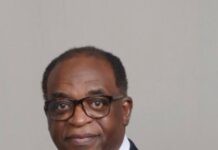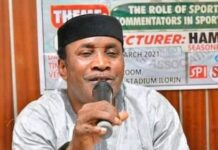 In my column of 5th August, I had argued that the party system in Nigeria was being remoulded and indications were that we were moving towards a simple two-party system. The reason was of course the recognition of the merger of some opposition parties into the APC and the second is the court judgement that INEC cannot de-register political parties. Both developments were in my view very positive for the deepening of Nigerian democracy. This weekend, we witnessed significant further development with the fractionalization of the ruling Peoples Democratic Party, (PDP) following the emergence of a new faction led by former Vice President Atiku Abubakar and seven governors of the party. They include the Chairman Northern Governors’ Forum, Babangida Aliyu of Niger State, Governors Sule Lamido of Jigawa, Rabiu Kwankwaso of Kano, Murtala Nyako of Adamawa, Magatakarda Wammako of Sokoto, Abdulfatah Ahmed of Kwara State and Rotimi Amaechi of Rivers State.
In my column of 5th August, I had argued that the party system in Nigeria was being remoulded and indications were that we were moving towards a simple two-party system. The reason was of course the recognition of the merger of some opposition parties into the APC and the second is the court judgement that INEC cannot de-register political parties. Both developments were in my view very positive for the deepening of Nigerian democracy. This weekend, we witnessed significant further development with the fractionalization of the ruling Peoples Democratic Party, (PDP) following the emergence of a new faction led by former Vice President Atiku Abubakar and seven governors of the party. They include the Chairman Northern Governors’ Forum, Babangida Aliyu of Niger State, Governors Sule Lamido of Jigawa, Rabiu Kwankwaso of Kano, Murtala Nyako of Adamawa, Magatakarda Wammako of Sokoto, Abdulfatah Ahmed of Kwara State and Rotimi Amaechi of Rivers State.
The emergence of this faction was dramatic as earlier that day; some of the governors had walked out of Eagle Square, venue of the special convention of the PDP in protest against some sudden change of rules at the convention. The leadership of the faction has Abubakar Kawu Baraje as national chairman, while Sam Jaja and Oyinlola emerged as Deputy National Chairman and National Secretary respectively. In his speech, the faction chairman announced that their action was in response to “increasing repression, restrictions of freedom of association, arbitrary suspension of members and other such violations of democratic principles by a faction of our party led by Alhaji Bamanga Tukur.” He added that the desperate permutations towards 2015 general elections has led to the serial abuse of the party constitution by Bamanga Tukur and his fellow travelers. He directly fingered the presidency as responsible for shutting out any real or imagined opposition ahead of the party’s presidential primaries for the 2015 elections.
Two weeks previously, Atiku Abubakar’s political friends had earlier succeeded in converting their political movement – the Peoples Democratic Movement (PDM) into a registered political party. There have been press reports that the PDP desperately tried to prevent the registration of the PDM by INEC. Alhaji Ibrahim Bashir Yusuf, a close associate of Atiku Abubakar, leads the Interim Management Committee of the PDP. So are the other members – Chief Dubem Onyia, Prince Tonye Princewill, Senator Abubakar Mahdi, Dame Titi Ajanaku, Hon Bode Ajewole and Alhaji Murtala S. M. Yar’Adua. The PDM was quick to congratulate the “brave, bold and patriotic action” of the factionalists that have set out to splinter the PDP. Not surprisingly, the Progressive Governors Forum composed of ten non-PDP governors have also saluted the emergence of the new faction and expressed their willingness to work with them.
The unfolding turmoil in the party seen is of course a direct reaction to our recent political history. Since 1999, Nigeria has operated as a one party dominant political system in which the PDP held sway and controlled enormous resources compared to the other parties. Since the emergence of President Obasanjo in 1999, the President of the country has always imposed himself as the leader of the dominant party although a party chairman had always existed. At the state level, the governors are the party leaders. Atiku Abubakar and the others have learnt their lessons; you cannot aspire to the presidential nomination of the PDP without the active support of the sitting president. As Goodluck Jonathan’s ambition to contest for another term in office is the worst kept secret in contemporary Nigeria, the tactics of dividing the ruling party while preparing to use an alternative party, as a platform could be an effective one.
This approach is novel. During the Second Republic, the ruling National Party of Nigeria adopted the tactic of encouraging and funding the emergence of factions in the other parties – the Peoples Redemption Party, the Nigerian Peoples’ Party and the Great Nigeria Peoples’ Party. State power was used to recognise the new factions over the “legitimate” ones so that anti-NPN forces were destabilised and left running around for an electoral platform. Some people might have re-read the history of the Second Republic and decided to use the tactics which is normally used by the ruling party against it. Of course this is possible only because President Goodluck Jonathan has failed to keep the loyalty of many of the governors who got their positions on the platform of the PDP.
In a sense, the PDP is becoming a victim of the excessive power of its owner, and there is no doubt that whoever is President literally owns the PDP and can do what he wants with the party. Of course the same is basically true of most other registered parties, which are “owned” by the godfather that set them up. The original sin of most Nigerian political parties is that they are owned by godfathers and barons rather than by party members. These parties have clientelist networks that are used by the party barons to “deliver” crowds for rallies and party congresses. Indeed, parties tend to treat their members with disdain and utter disrespect. Consequently, the political relationship within the parties is essentially one between patrons and clients and the clients are mobilised on pecuniary, religious, ethnic or regional basis.
For me, the real question at this time is whether the newly emerging parties will be any different. We already know that state governors, all of who are respective “owners” of their parties in their home base are the key drivers in the establishment of the new parties. Can they change their behaviour and submit the new parties to due process, internal party democracy and respect for the views of party members? The transition will be very difficult but the fact of the matter is that it must happen if we are to consolidate our democracy.
As I have argued severally, Nigerians have always wished for a political system with only two or three parties so that political choice can be exercised in a context of clarity and real alternatives. This was the vision we were confronted with when I served in the Justice Uwais Electoral Reform Committee. The position that the Committee took, which I strongly support, was that it was not the role of government to reduce the number of political parties. It is the political terrain that should evolve the appropriate party system.
The tradition in Nigeria is that competition is very intense within the ruling party and less so between the political parties. This is due to the fact that since 1979, Nigeria has developed the tradition of major blocs of the political elite coalescing into a single political party conceived as a hegemonic party. In elections that are relatively free and fair, namely, the 1959, 1979 and 1999 elections, the parties that had the highest votes, the Northern Peoples’ Congress, the National Party of Nigeria and the Peoples’ Democratic Party failed in their desire to be hegemonic or dominant through the polls. In the subsequent elections of 1964, 1983 and 2003, they all abused their incumbency powers to transform themselves into dominant parties. In essence, they used electoral fraud to boast their control of the political process and weaken opposition parties. This has been the reason why competitive party politics has been weak. The ruling parties have too often falsified the electoral game while the parties in opposition hove had too narrow a political base and insufficient resources to effectively compete for power.
Today, we are living in interesting times. For the first time, real moves are emerging from the political terrain aimed at significantly weakening the ruling party and establishing real alternatives. It is in this context that the emergence of the APC, the PDM and the PDP splinter could be a life changer in the party system we operate. If the present trend is sustained, the cream of the political elite seeking access to power could have a couple of alternative platforms to realise their ambitions outside the dominant party. Of cause all this will depend on the capacity of the new formations to change the character of our politics by accepting the principles of internal party democracy.


